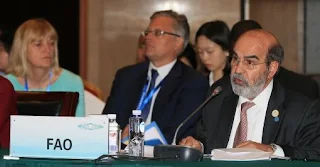The G20 Ministers of
Agriculture have affirmed the importance of Information and Communication
Technology (ICT) at the end of their meeting, reports NaijaAgroNet.
A communique from the
meeting made available to NaijaAgroNet, the ministers affirmed the importance
of ICT in agriculture, calling it “essential to human, social and economic
development,” and stressing “the potential to reach farmers --including smallholders
and family farmers-- with timely and accessible content on markets, sustainable
and efficient farming practices and new technologies
The partnership structured
at the G20 meeting, NaijaAgroNet gathered is part of a larger digital strategy Food
and Agriculture Organisation (FAO) is developing to integrate a wide
range of technologies, ranging from satellite data to mobile phones and social
platforms, with the agency’s work to support the most vulnerable with access to
information and bottom-up learning.
“We have to bear in
mind that small farmers in developing countries are often constrained in their
access to inputs, technology, and markets. In order to ensure that farmers
fully leverage the ICT opportunities, it is essential to provide digital
tailored access, foster capacity development and facilitate the exchange of
experiences,” he said.
The FAO Director-General,
José Graziano da, highlighted joint work between FAO and G20 countries on such
projects as the Agricultural Market Information System (AMIS),
the Tropical Agriculture Platform (TAP) and the G20 Technical Platform for the Measurement and Reduction
of Food Loss and Waste.
He also underlined the
ongoing international efforts to address Antimicrobial Resistance in
partnership with the World Health Organization and the World Organization for
Animal Health and called on G20 countries to support FAO in this
endeavour.
... Linking agrobiz, sustainable environs, people & technology












